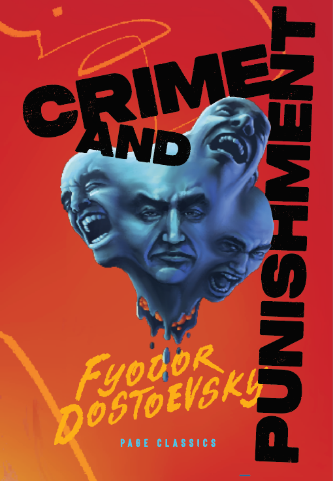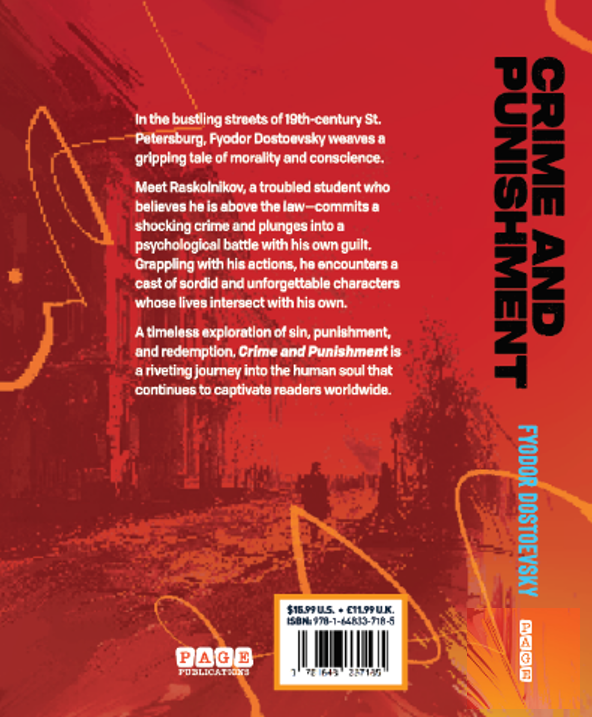Crime and Punishment FYODOR DOSTOEVSKY
- Precio habitual
- $7.99 USD
- Precio habitual
-
$15.99 USD - Precio de venta
- $7.99 USD
- Precio unitario
- por
Type : Fiction
SKU : 9781648337185
No se pudo cargar la disponibilidad de retiro
Crime and Punishment by Fyodor Dostoyevsky is one of the most profound and enduring works of world literature, exploring themes of guilt, morality, redemption, and the psychology of crime. Published in 1866, the novel is set in the grim, oppressive streets of St. Petersburg, where it introduces Rodion Raskolnikov, a former student who is destitute and consumed by a sense of alienation from society.
The novel begins with Raskolnikov’s belief that he is an extraordinary man, someone who is beyond conventional moral laws, and thus entitled to commit acts that others might consider immoral if they serve a greater good. He conceives a plan to murder Alyona Ivanovna, an old pawnbroker whom he views as a greedy, parasitic figure, believing that her death will free him from his poverty and allow him to do something meaningful with his life. He convinces himself that, like Napoleon or other great figures in history, he is above the law of morality and that his crime can be justified for the greater good.
However, after committing the murder, Raskolnikov’s life unravels. The act of killing Alyona, far from elevating him, plunges him into a world of torment. He is not only physically repelled by the crime but mentally overwhelmed by guilt, as the moral fabric he has rejected now returns to haunt him. This internal conflict manifests in a series of hallucinations, feverish dreams, and encounters with people who begin to reveal the profound consequences of his crime—not just for his victim but for his own soul.
The character of Raskolnikov is a study in psychological disintegration. Initially, he is detached from the consequences of his actions, but his conscience begins to surface, forcing him into an emotional and mental breakdown. As he becomes entangled in a game of cat-and-mouse with Porfiry Petrovich, the shrewd police investigator, Raskolnikov finds himself increasingly isolated and unable to escape the suffocating weight of his guilt. The more he tries to rationalize his crime, the more deeply he is tortured by his conscience.
Through Raskolnikov's inner turmoil, Crime and Punishment explores the nature of sin, punishment, and the possibility of redemption. The novel asks difficult questions about moral relativism—whether some crimes can ever be justified by a higher moral purpose—and the profound effects that guilt can have on a person’s psyche. Raskolnikov’s belief in his own intellectual superiority is ultimately shattered by the realization that no one can escape the moral laws that govern human existence.
The novel also introduces several other characters who serve as foils to Raskolnikov, each representing different responses to suffering, morality, and redemption. Sonia Marmeladov, a humble and self-sacrificing woman who turns to prostitution to support her family, becomes an unexpected figure of grace and compassion for Raskolnikov. Her faith, strength, and willingness to forgive contrast sharply with his growing despair, and she becomes a catalyst for his eventual path to repentance. Other characters, like Dunya (Raskolnikov’s sister) and Razumihin (Raskolnikov’s friend), represent love and loyalty, providing glimpses of a path toward salvation.
As Raskolnikov's mind spirals into paranoia, he begins to question the very idea of justice and divine retribution. Through his interactions with other characters, Dostoyevsky probes deeper questions about human nature, the existence of God, and the role of suffering in the spiritual journey.
The novel’s title, Crime and Punishment, encapsulates its dual focus on the consequences of crime and the nature of punishment—both external and internal. Raskolnikov’s journey is ultimately one of spiritual awakening. While the law of society seeks to punish him for his crime, it is his own conscience—the internal realization of the immorality of his act—that leads to his punishment. And it is only through acknowledging his guilt and seeking redemption, symbolized by his willingness to face the consequences, that he begins the long road toward spiritual salvation.
Crime and Punishment remains one of the most powerful examinations of the human soul and its capacity for both evil and redemption. Dostoyevsky’s mastery of psychological realism and his exploration of moral philosophy make the novel not only a gripping narrative but also a deeply thought-provoking work that resonates with readers across generations. It challenges us to consider the nature of good and evil, justice and mercy, and the redemptive power of conscience.
5.1 x 7.87 (Inches)
608 Pages



